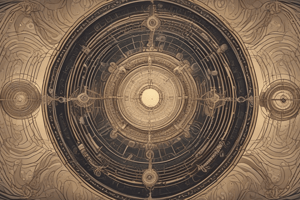Podcast
Questions and Answers
What is the primary function of sleep according to the content?
What is the primary function of sleep according to the content?
- To maintain muscle tone
- To restore energy depleted during the day (correct)
- To regulate body temperature
- To process sensory information
Which brain waves are associated with REM sleep?
Which brain waves are associated with REM sleep?
- Theta waves
- Beta waves (correct)
- Delta waves
- Alpha waves
What role does the suprachiasmatic nucleus (SCN) play in circadian rhythms?
What role does the suprachiasmatic nucleus (SCN) play in circadian rhythms?
- It sends signals to the pineal gland (correct)
- It synchronizes sleep stages
- It regulates heart rate
- It produces melatonin
What is a common effect of ignoring circadian rhythms?
What is a common effect of ignoring circadian rhythms?
Which stage of sleep is characterized by higher-frequency brain waves and sleep spindles?
Which stage of sleep is characterized by higher-frequency brain waves and sleep spindles?
What are Zeitgebers in the context of circadian rhythms?
What are Zeitgebers in the context of circadian rhythms?
What term describes the 'sleep debt' that must be repaid due to insufficient sleep?
What term describes the 'sleep debt' that must be repaid due to insufficient sleep?
What is the main characteristic of delta waves?
What is the main characteristic of delta waves?
Which type of drugs is associated with tolerance and dependence?
Which type of drugs is associated with tolerance and dependence?
What differentiates slow wave sleep (SWS) from other stages?
What differentiates slow wave sleep (SWS) from other stages?
What is one of the long-term benefits of mediation practices?
What is one of the long-term benefits of mediation practices?
Which psychoactive drug is primarily used for its pain-relieving properties?
Which psychoactive drug is primarily used for its pain-relieving properties?
What type of drugs are characterized by distortions in sensory and perceptual experiences?
What type of drugs are characterized by distortions in sensory and perceptual experiences?
Alcohol can be classified as which type of psychoactive drug?
Alcohol can be classified as which type of psychoactive drug?
What is the term for the progressive decrease in a person's responsiveness to a drug?
What is the term for the progressive decrease in a person's responsiveness to a drug?
Which of the following substances is classified under stimulants?
Which of the following substances is classified under stimulants?
What is one effect of mediation on mental health?
What is one effect of mediation on mental health?
Which of the following is true regarding cannabis?
Which of the following is true regarding cannabis?
What primarily characterizes slow wave sleep (SWS)?
What primarily characterizes slow wave sleep (SWS)?
Which age group typically experiences the least amount of sleep?
Which age group typically experiences the least amount of sleep?
What is a common symptom of insomnia?
What is a common symptom of insomnia?
Which treatment is considered a poor long-term solution for insomnia?
Which treatment is considered a poor long-term solution for insomnia?
Sleep apnea is characterized by what specific event during sleep?
Sleep apnea is characterized by what specific event during sleep?
What is a defining feature of night terrors?
What is a defining feature of night terrors?
According to Freud's wish fulfillment theory, dreams primarily serve what purpose?
According to Freud's wish fulfillment theory, dreams primarily serve what purpose?
What is the primary cause associated with narcolepsy?
What is the primary cause associated with narcolepsy?
Which of the following themes is most commonly reported in dreams?
Which of the following themes is most commonly reported in dreams?
What is a characteristic feature of REM sleep?
What is a characteristic feature of REM sleep?
Which hypnotic phenomenon allows individuals to withstand pain during treatments?
Which hypnotic phenomenon allows individuals to withstand pain during treatments?
What does disinhibition in hypnosis entail?
What does disinhibition in hypnosis entail?
Which theory posits that hypnosis results from everyday cognitive processes and expectations rather than a unique trance state?
Which theory posits that hypnosis results from everyday cognitive processes and expectations rather than a unique trance state?
What is one of the key characteristics of the dissociation theory in hypnosis?
What is one of the key characteristics of the dissociation theory in hypnosis?
What phenomenon might cause a person to hear or see things that are not actually present during hypnosis?
What phenomenon might cause a person to hear or see things that are not actually present during hypnosis?
Which of these statements about posthypnotic suggestions are true?
Which of these statements about posthypnotic suggestions are true?
Highway hypnosis is best described as a phenomenon where an individual:
Highway hypnosis is best described as a phenomenon where an individual:
Which of the following would NOT be a typical outcome of hypnosis according to its hypnotic phenomena?
Which of the following would NOT be a typical outcome of hypnosis according to its hypnotic phenomena?
Flashcards
Consciousness
Consciousness
Awareness of internal and external stimuli; a stream of mental activity.
Electroencephalograph (EEG)
Electroencephalograph (EEG)
A device that records the electrical activity of the brain.
Circadian rhythms
Circadian rhythms
Daily cyclical variations in biological and mental processes.
Suprachiasmatic Nucleus (SCN)
Suprachiasmatic Nucleus (SCN)
Signup and view all the flashcards
Sleep stages
Sleep stages
Signup and view all the flashcards
REM sleep
REM sleep
Signup and view all the flashcards
Slow-wave sleep (SWS)
Slow-wave sleep (SWS)
Signup and view all the flashcards
Sleep deprivation
Sleep deprivation
Signup and view all the flashcards
Sleep-wake cycle
Sleep-wake cycle
Signup and view all the flashcards
Brain waves
Brain waves
Signup and view all the flashcards
Non-REM Sleep
Non-REM Sleep
Signup and view all the flashcards
Sleep Restriction
Sleep Restriction
Signup and view all the flashcards
Insomnia
Insomnia
Signup and view all the flashcards
Narcolepsy
Narcolepsy
Signup and view all the flashcards
Sleep Apnea
Sleep Apnea
Signup and view all the flashcards
Nightmares
Nightmares
Signup and view all the flashcards
Ascending Reticular Activating System (ARAS)
Ascending Reticular Activating System (ARAS)
Signup and view all the flashcards
Hypnosis
Hypnosis
Signup and view all the flashcards
Hypnotic Phenomena
Hypnotic Phenomena
Signup and view all the flashcards
Hypnotic Anesthesia
Hypnotic Anesthesia
Signup and view all the flashcards
Sensory Distortions/Hallucinations
Sensory Distortions/Hallucinations
Signup and view all the flashcards
Disinhibition
Disinhibition
Signup and view all the flashcards
Posthypnotic Suggestions/Amnesia
Posthypnotic Suggestions/Amnesia
Signup and view all the flashcards
Social-cognitive theory of hypnosis
Social-cognitive theory of hypnosis
Signup and view all the flashcards
Altered state theory of hypnosis
Altered state theory of hypnosis
Signup and view all the flashcards
What is the benefit of mediation?
What is the benefit of mediation?
Signup and view all the flashcards
How does Meditation affect stress response?
How does Meditation affect stress response?
Signup and view all the flashcards
What are the mental health benefits of meditation?
What are the mental health benefits of meditation?
Signup and view all the flashcards
What are the positive effects of meditation on social skills?
What are the positive effects of meditation on social skills?
Signup and view all the flashcards
What is Psychoactive drug?
What is Psychoactive drug?
Signup and view all the flashcards
What are narcotics?
What are narcotics?
Signup and view all the flashcards
What are stimulants?
What are stimulants?
Signup and view all the flashcards
What are hallucinogens?
What are hallucinogens?
Signup and view all the flashcards
Study Notes
Variations in Consciousness - Key Concepts and Terms
- Consciousness is awareness of internal and external stimuli; a subjective experience with varying levels of awareness.
- William James coined the term "stream of consciousness."
- Electroencephalograph (EEG) measures electrical brain activity (brain waves) via electrodes on the scalp.
- Brain waves vary in amplitude and frequency (e.g., beta waves for awake/alert, delta waves for deep sleep).
- Circadian rhythms are daily cyclical variations in biological processes, governed by a 24-hour internal clock.
- The suprachiasmatic nucleus (SCN) in the hypothalamus regulates the sleep-wake cycle and melatonin secretion by the pineal gland, in response to light.
- Ignoring circadian rhythms affects sleep quality and can cause jet lag. Adjusting to time zone changes is easier with westward travel.
- Sleep deprivation/restriction impairs attention, reaction time, cognition, motor skills, and decision-making.
Stages of the Sleep-Wake Cycle
- Sleep stages, from stages 1 to 4, represent decreasing alertness, and increasing slow wave sleep.
- Stage 1 is a brief transitional stage with decreasing physiological activity.
- Stage 2 involves brief bursts of higher-frequency brain waves.
- Stages 3 and 4 are slow-wave sleep, characterized by high-amplitude, low-frequency delta waves.
- REM sleep (stage 5) is characterized by rapid eye movements, vivid dreaming, high-frequency/low amplitude brain waves. It's important for memory consolidation and emotional processing.
- Sleep stages 1-4 are often referred to as non-REM sleep.
Sleep Disorders
- Insomnia is chronic difficulty sleeping, affecting nearly one-third of adults. Symptoms include difficulty falling/staying asleep, early-morning awakenings.
- Narcolepsy involves sudden, irresistible sleep attacks during normal waking periods.
- Sleep apnea is a condition where breathing stops and restarts repeatedly during sleep.
- Nightmares and night terrors are anxiety-inducing dreams. Night terrors usually involve abrupt awakenings from non-REM sleep.
- Somnambulism (sleepwalking) happens during stages 1-2.
- REM sleep behavior disorder (RBD) occurs during REM sleep, with the person acting out their dreams.
Theories of Hypnosis
- Social-cognitive theory: Hypnosis is a result of normal factors like expectation and suggestion.
- Altered-state theory: Hypnosis is a unique state of consciousness different from normal wakefulness and sleep.
Effects of sleep restriction/deprivation
- Sleep restriction/deprivation impairs attention, reaction time, cognition speed, accuracy, motor coordination, and decision-making.
- Causes an increase in transportation accidents and mishaps in the workplace.
- Increases health care costs, costing the economy billions of dollars.
Dream Theories
- Freud's wish fulfillment theory: Dreams fulfill ungratified needs.
- Problem-solving, activation-synthesis, and other dream theories exist.
Types of Psychoactive Drugs
- Narcotics (e.g., heroin, morphine) alleviate pain, but have high physical and psychological dependence potential.
- Sedatives (e.g., benzodiazepines) reduce CNS activation, common side effects include drowsiness and sluggishness, and are highly addictive.
- Stimulants (e.g., caffeine, nicotine, cocaine) increase CNS activation and behavioral activity, with various dependence risks.
- Hallucinogens (e.g., LSD) cause distortions in sensory perception.
Tolerance and Dependence
- Tolerance is a decreased responsiveness to a drug over time, requiring larger doses for the same effect.
- Dependence is a state where the person needs the drug to avoid withdrawal symptoms or satisfy intense cravings, a serious issue.
Alcohol and Other Drugs
- Alcohol is the most commonly used recreational drug, with moderate dependence.
- MDMA (ecstasy) is a compound drug related to amphetamines and hallucinogens, and was at its height of popularity in the 1990s.
- Cannabis (marijuana) contains THC and has low to moderate dependence potential
Studying That Suits You
Use AI to generate personalized quizzes and flashcards to suit your learning preferences.




